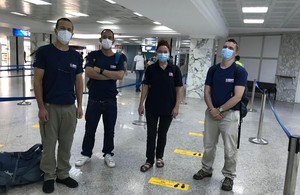UK Emergency Medical Team deployed to help Tunisia tackle Covid-19 crisis
Doctors, nurses and logistics experts from the UK's Emergency Medical team will provide clinical supervision and support to Tunisian healthcare services.

UK Emergency Medical Team arrive in Tunisia
Following a request from the Tunisian Government, experts from the UK’s Emergency Medical Team (UK EMT), supported by the UK-Public Health Rapid Support Team (UK-PHRST) have arrived in Tunisia today (13 August) to help the country tackle their COVID-19 crisis.
The team includes nine doctors, nurses and logistics experts, from the UK, France, the Democratic Republic of the Congo and Italy. The medical experts specialise in emergency medicine and infection, prevention and control, as well as humanitarian healthcare. They will provide clinical supervision and support to Tunisian healthcare services and are expected to deploy for up to twelve weeks.
COVID-19 infections in Tunisia are rapidly increasing and the health crisis is exacerbating the economic crisis in the country. As the number of new COVID-19 cases and deaths surged in Tunisia in July, hospitals and ICU beds across the country became full or were stretched to near maximum capacity.
The UK-PHRST supports low- and middle-income countries in investigating and responding to disease outbreaks, and conducts research to improve our response to future epidemics. In this deployment, a UK-PHRST infection, prevention and control (IPC) specialist will work alongside the EMT staff, training health professionals in IPC management.
UK Minister for the Middle East and North Africa, James Cleverly, said:
COVID-19 has delivered major blows to the Tunisian health system and economy, with the number of daily cases of real concern.
This deployment of a UK Emergency Medical Team will provide British expertise to Tunisian health care professionals, helping them to tackle the health crisis and saving lives.
Paul Ransom, UK EMT Interim Team Lead and British Emergency Department Consultant, said:
As members of UK- Med and the UK- Emergency Medical Team, we are proud to be in Tunisia to assist the Tunisian people in their response to COVID-19.
We will be helping the national teams to provide hands-on care to patients, carrying out specialist training and giving support to our Tunisian colleagues in the demanding and vital work they carry out every day in combatting COVID-19.
Notes to editors
- The UK Government’s Emergency Medical Team (UK EMT), which has World Health Organization (WHO) classification, is a rapid medical response capability funded by the Foreign Commonwealth & Development Office (FCDO).
- Since the outbreak of the coronavirus pandemic, the UK EMT has supported the WHO and health ministries in deployments of over 100 medical experts to Armenia, Bangladesh, Burkina Faso, Cambodia, Chad, Lesotho, Eswatini, Lebanon, Ghana, South Africa, and Zambia, and is currently deployed to Namibia and Botswana.
- The UK EMT can deploy anywhere in the world at 24-72 hours’ notice in the event of a rapid onset emergency. This multilateral team of experts provides direct delivery of front-line medical care and world class expertise to advise and support governments during disease outbreaks and humanitarian emergencies.
- UK-Med is a Manchester-based emergency health charity with thirty years’ experience responding to health emergencies around the world. Since February 2020 UK-Med has supported the UK EMT, World Health Organization and health ministries in the fight against coronavirus in Ghana, South Africa, Cambodia, Burkina Faso, Bangladesh, Chad, Zambia, Armenia, Eswatini, Lesotho, Djibouti and Lebanon.
- The UK-PHRST is a partnership between Public Health England and the London School of Hygiene and Tropical Medicine (LSHTM), funded by UK aid through DHSC’s Global Health Security Programme.
Media enquiries
Email newsdesk@fcdo.gov.uk
Telephone 020 7008 3100
Email the FCDO Newsdesk (monitored 24 hours a day) in the first instance, and we will respond as soon as possible.